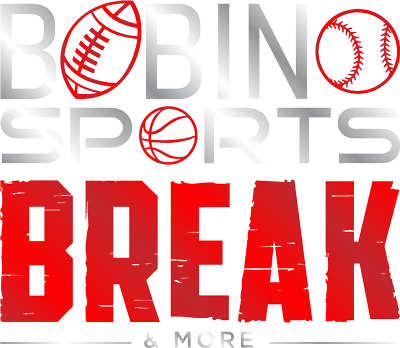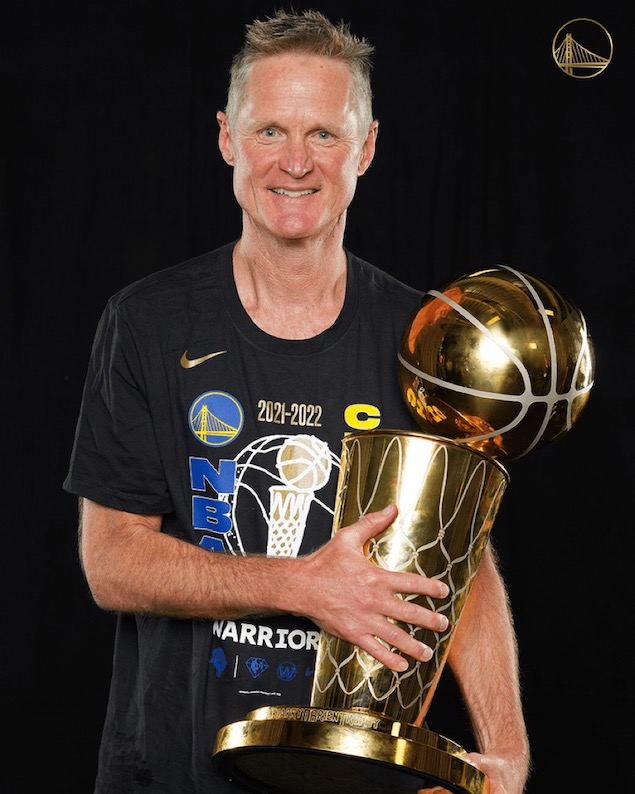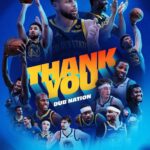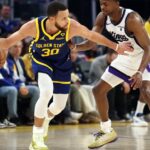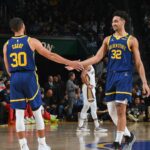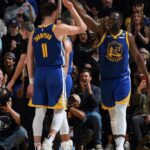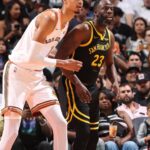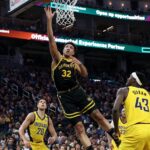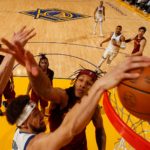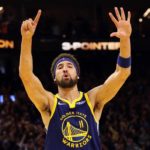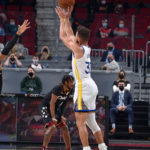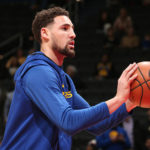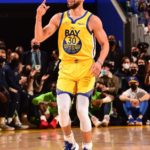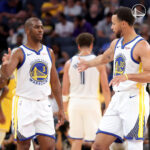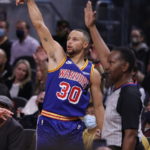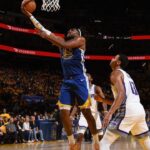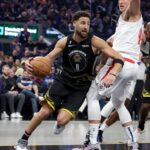SAN FRANCISCO – Warriors head coach Steve Kerr answers questions from the media at his end of the year press conference.
Q. Where are you at in the process of deciding on your coaching staff and obviously the opening that Mike’s departure leaves?
STEVE KERR: Yeah, we’re kind of right in the middle of discussing that now. Obviously with Bob and the front office dealing with the draft we can’t get everything finalized, but we’re having some internal discussions about different options, but nothing has been decided yet.
Q. Steve, the hardest thing to do in sports is win and grow for the future at the same time. How well do you think you did that, and how much is whatever Kuminga and Moses and even James, even though he couldn’t play, whatever they experienced, how important is that to what happens next year?
STEVE KERR: Yeah, I mean, I think it is difficult to do. It was ambitious from the start, because really we started doing this last year when we drafted James. We didn’t make any moves and we talked about — I think I used the term threading the needle, and that’s what it felt like.
And then of course last summer there was a lot of clamor for Joe and Bob and the group to trade for a veteran to give us a better chance at a title.
For us to win it and hang on to our young players, it couldn’t have worked out any better. Doesn’t guarantee anything for the future, but it’s just a great position to be in where you’ve got some really talented guys like Jordan and James, JK, Moses, who represent the future, but they’re still learning from these championship players in their own locker room.
It’s all set up well, but now we’ve got to go do it. So it’s exciting.
Q. What do you make of the way (indiscernible)?
STEVE KERR: I think the Playoffs are really unique. You often see players from around the league coming — young players coming to a Finals game with their head coach.
Sometimes they’ll pan to the sidelines during the Finals and you’ll see a young star with his coach and trying to absorb the atmosphere.
So it’s that times ten because you’re in all the meetings, you’re sitting there, sometimes you’re getting in the game. Like all of that for a two-month journey. That’s what makes winning an NBA championship so hard.
It’s two months of prepping for four different teams and the stress of not only the games, but then waiting for the next game to start and the anticipation.
So for our young players to see that and see how our older players navigated that, it’s huge experience for them and it’ll come in handy.
And then the playing time. Moses playing significant minutes against Dallas; JK played significant minutes against Memphis. So it all matters.
Q. Back to Andre’s challenge to improve each round, what were the factors in that coming together? And also, how much do you appreciate the flexibility that everybody showed as rotations changed from Looney to Porter and Poole’s varying roles and everything?
STEVE KERR: Yeah, so the first part of it, you could see the improvement both individually and collectively. Wiggs stands out for both his on-ball defense and his rebounding. That’s exactly what Andre was talking about.
You kind of have to figure out what’s it going to take for us to win this series. Wiggs was a perfect example. We need you to guard Ja Morant, Luka, Jayson Tatum, but we need you to rebound, too, and he did all that.
For Gary to come back from his injury and play such a big role in the Finals with his defense, and for Loon to take another step forward, that’s what it takes to win a championship.
Obviously you need your stars to play like stars, and we got that, but we stayed healthy and we got better as we went along. Very gratifying as a coach.
And then the other part of it, the flexibility, guys going in and out of the lineup, the rotation, again, that kind of selflessness is critical on this path.
It’s one of the most gratifying aspects of this championship, was just how selfless everybody was and everybody was all in, and you could kind of feel the magic starting to happen as we went further and we were able to complete the deal.
Q. How important do you view this summer for James Wiseman? And because of his inexperience at this point, how vital do you think it is to bring Kevon Looney back?
STEVE KERR: Yeah, it’s a big summer for James, and good news is he’s doing really well. I was just talking to Rick, and James is coming along well. We’re anticipating that he’ll be part of Summer League, and excited for that.
Loon, what more do we need to say about Loon? He’s a championship center, modern day defender, switch defender, which is what it takes in the Playoffs. As the 30th pick in the draft seven years ago, the way he’s developed, the way he’s worked, the way he has become such a big part of our internal leadership and our fabric, he’s a huge component to our success.
We all want him back. We also are rooting for him personally to get a really good contract, so hopefully it’s from us.
Q. You said a lot of people said we’re only going to get better next year, but how much does that depend on retaining as many of your free agents and bringing as many players back as possible and building off of this?
STEVE KERR: Yeah, I mean, that’s a big part of it, but you can never predict how this stuff is going to play out. All we can do is plan for next season and get going again in September, late September. But we definitely want those guys back. We’ve got a lot of key free agents and they were all really big part of this championship. We’ll see how it all plays out.
Q. Going back to Andre, we don’t really know what his plans are, if he wants to come back for one more season or what. I know he has a lot of off-the-court stuff, like business endeavors that he has. Has he expressed throughout the Playoffs any interest in wanting to be a coach, or what kind of future do you think you see in him pursuing that path?
STEVE KERR: I think he’s way too smart to sit next to me and come to all our coaches’ meetings and do this. He was a coach this year in the locker room for our guys. I would love to have him back on the roster if it works out — and I know Bob feels the same way — and things have to fall into place.
Andre and I have talked, and we’re going to connect here in the next couple of weeks as he kind of sorts through his decision. It’s never an easy thing to retire and walk away from a game that you love, from people that you love, so it’s a really big decision for him.
As I said, if he decides to come back we’d be thrilled, because he means so much to us in so many different ways.
Q. With it sounding like James will probably play in Summer League at some point, obviously health is a main priority, but what skill set are you kind of looking for the most from him, whether it be rebounding or something else?
STEVE KERR: I mean, I think defensive recognition, of patterns and rebounding, that’s what we can use from him the most.
Going forward, with his talent, with his size and athleticism, there’s no reason why he can’t be a dominant defensive player in the league. But it takes a lot of reps. It takes a lot of recognition. It takes a lot of being on the court with nine other people, not just being in a one-on-one workout or in the weight room.
Hopefully — knock on wood — hopefully he gets healthy and gets to start putting those reps together and develops into a fine defensive center. That would be the idea. You see how gifted he is offensively. He’s a lob threat. He’s a good shooter. It’s all there for him.
But he needs a break. He needs some things to go his way health-wise, and like I said, so far, so good, and we’re hoping that things continue to improve.
Q. Obviously different skill sets, different bodies, but how can Kevon be a little bit of an example for him with the intangibles, the little things, running the offense through the post with him?
STEVE KERR: Well, James spent a good part of this year watching Loon, watching tape of him, asking questions of him. They’re very different players, as you said, but playing the same position.
What makes Loon so good is the nuance in his game. He understands how to set the right screen at the right time for Steph and Klay, and he knows when to roll and he knows when to dive to the rim, when to get to the pocket if Steph is getting blitzed. He knows how to make the weak side pass out of the double-team.
This stuff doesn’t just happen. He’s worked at it. Loon’s first two years he never played. He was injured, too, just like James has been.
There couldn’t be a better mentor for James than Loon.
Q. Gary came out of college with the ability to defend immediately, but it took him five, six years to get to a point where he was in the rotation, and when he got to the rotation, he was in the rotation on a championship-winning team. How much of what he has gone through is the process of him getting better, and how much is it the league changing to accommodate someone who has his skills and put him in this position?
STEVE KERR: Probably a little bit of both. He’s really worked hard on his three-point shot. You saw him this year make big shots for us in the Playoffs and throughout the regular season. So that’s a lot of work.
The league has changed, so you’ve got a lot more smaller lineups, more spaced lineups. Our roster changed this year, which helps him get on the floor, just adding Otto and Bjeli and just having more bigs meant that we could play Gary at guard, but basically play him as a big man on offense, you know, as a great screener, diver.
You see he has a knack for scoring in transition, off offensive rebounds. He’s a unique player, different kind of player, but he’s really found his niche, and it’s great to see. He’s earned it.
Q. With your style of play, emphasis on the defense and moving the ball, you’ve got to be pretty savvy to play with you. But with that said, you’re probably about to add another youngster; might have like five guys under 20. How have you grown as a coach dealing with the guys who need developing and youngsters, and you played 19 year olds in the Playoff series. I don’t know if you would have done that in ’15. How have you grown dealing with such young players?
STEVE KERR: Well, I think we’ve grown organizationally, and that’s the main thing. Our Santa Cruz affiliate is so strong and the connection is so strong between the coaching staffs and the roster. Now compared to six, seven years ago, it’s completely different. We’ve got such a strong connection.
We’re monitoring development every single day. We’re running the exact same offense, the same terminology, and that really matters. So when we send a guy to Santa Cruz and he comes back, he’s got a head start.
We didn’t have that seven, eight years ago.
We also have more development coaches and more people in our training room, and so each guy, each young guy is getting more and more individual attention, and so that matters.
As far as how I look at it as a coach, you know me, I’ve always liked to play everybody on the roster. I just think empowering everyone is important.
Then you can’t go too far. You’ve got to — players have to earn it. But everybody on our roster knows that at some point during the season I’m going to give them a chance, and even if they’re rookies and 19 year olds.
I think that is empowering, and it’s great to have a veteran roster with mentors. Steph and Draymond and Klay, Andre, Loon, these guys are so good with our younger guys. The expression it takes a village, it really does. I think we’ve built a really strong organization that has figured out a much better way to develop our young guys.
Q. When it comes to adding youngsters to this team through the draft, is the philosophy still to find the best player available to fit the culture here?
STEVE KERR: That’s Bob’s department. I trust Bob and his staff. When you’re picking 28th or 30th there’s such a low chance of hitting, and the reality is our guys upstairs have hit for a really high average. You just look at the Finals, drafting Jordan and Loon — if you look at the numbers, I think guys at 28 and 30, there’s about a 10 percent chance that they make the league for an extended period of time.
Between those two guys, and going back, Draymond at 35 and Festus before he got injured was a really valuable player for us. So our group has done an amazing job late in the first round, into the second round. I’m glad it’s not my job. I just coach whoever they put out there, but they’ve done a great job putting our rosters together.
Q. How do you view your own kind of coaching future, and how invigorated are you to keep coaching?
STEVE KERR: Yeah, I’m excited. It was such a gratifying year coaching-wise. There’s so many great individual stories. Seeing Jordan develop, seeing Loon take a leap, seeing Andrew get to where he wanted to go, and it was such a great collaboration between our entire organization. I could go on.
Just the veterans who came in, Bjeli and Otto, for them to experience something so powerful and meaningful later on in their careers, all that stuff is what makes you want to come coach every day.
Now here we are, we’ve got the windows open, we’ve got all these young guys who are really talented. I think we can be really good again, and I’m excited for a vacation and I’m excited to come back and coach again next year.
Q. Coach, Draymond said at some point during the Finals that he wanted to win this championship for the rookies, the young players, to allow them to play more free, and rather than some players who spend their entire career chasing a ring. Do you think that does relieve some pressure from the young players on this team, or does it change maybe the mindset or the way that you play after you’ve won a championship?
STEVE KERR: I think that’s one of the most powerful things about winning a title is the freedom that comes with it. You know, I’m able to coach more freely because we won a championship in ’15.
It just — there’s a feeling that comes with it where like you’re just not encumbered. You can be more free. That goes as a player, too.
When Steph and Draymond and Klay and Andre won that first one in ’15 it was incredibly liberating. Sometimes, especially if you’re a great player, I don’t think role players feel it, but the great players in this league, especially today, they get tagged with the, well, he’s never won a championship image or whatever you want to call it. Even though that’s unfair, it’s a real thing.
For our young guys to be champions, to have championship rings, it does relieve some pressure from them.
Q. You were asked at the parade how many more championships you might win with this team and responded something along the lines of “how much longer is Steph going to be playing here?” Myers said he thinks the argument could be made that Steph is playing the best basketball of his career. Realistically in your mind how much does he have left in the tank, and would you say he is really peaking still now at 34?
STEVE KERR: I think he absolutely peaked in the Playoffs. I think it’s going to be harder for him next year at 35 and the following year to put together an 82-game season like he did seven years ago.
But in the Playoffs, when you’ve got time off in between games and you’re really locked in, this was the best I’ve ever seen him in terms of his two-way performance. His defense was spectacular. He’s gotten so much stronger. His ability to hold people up who are coming at him, I saw the isolation defense numbers.
I think it was like .79 for Steph in the Finals. That’s pretty incredible with Jaylen Brown and Jayson Tatum coming downhill at you over and over again.
So Steph has never been better defensively, and like I said, in the Playoffs when you get time to rest at 34, 35, 36, there’s no reason why he can’t continue to have playoff runs like this.
But it’s all out there for him, and we know he’s going to work for it. It’s fun to just be a part of it.
Q. Dynasties: Can you talk a little bit about dynasties? You have one at Golden State. In 75 years there’s only a handful of them, and you’ve been a part of I want to say three. But we’re talking about Golden State. Can you talk about your dynasty? Again, it’s a tremendous upside.
STEVE KERR: Yeah, I mean, I don’t know how you quantify dynasty, but whatever that means, to win four championships in eight years, pretty special.
Having been a part of the Spurs and the Bulls as a player, it takes obviously superstar players, but also really strong, well-run organizations. We have that here. We’ve got an ownership group that is committed to winning. They have been since day one.
We’ve got players who are motivated to stay together and stay here and keep trying to win together. We’ve got great leadership and management from upstairs.
It’s a pleasure to be part of it, and I count my blessings. Trust me, I’ve lived a charmed NBA existence, to be part of three different organizations like I have that have been so successful.
Q. If you have to look at this championship roster, what do you think is the DNA that this core has built? What makes this ride so special?
STEVE KERR: Well, they’re very unique individually and they fit together collectively. Basketball really is a — a team is like a puzzle. The pieces have to fit. You can’t just throw five great players out there and expect it to work.
You’ve got to have guys with different skill sets who complement one another. I think that’s the real Magic behind this team. Steph, Draymond and Klay all make each other better, and that’s the core group that started all this and that continues to do this.
Obviously we’ve had a lot of really great, important players as part of that. Andre has been a huge part of it and so many others.
I think the core group, that championship DNA has everything to do with the continuity of those guys being together and the skill sets really complementing one another.
Q. Speaking about next season, what leads to your confidence that the Warriors are going to be even better as a team, and how likely is it you can raise the level of the team overall?
STEVE KERR: Yeah, my experience is when you win a championship you get better the next year. If you keep going after that, it starts to wear you out. That third year for us, trying to get a three-peat in ’19 was brutally difficult.
But whether I was a player or now as a coach, you win that first one, there’s a freedom that comes with it. There’s an excitement, and that carries over into the second year.
Given that we just had a two-year opportunity to refill our cups and reenergize, I think we’ll be really motivated going into next year, and the guys will have a great chance to have a hell of a season again.
James hopefully will fit into that health-wise. That’s the biggest thing. We will continue to work with him every day. He’ll continue to develop, just like all of our young guys will.
It’s fun to look at some of the young talent on the roster. But every year is different, and you just have to let it play out and see how it goes.
Q. Where are you at in the process of deciding on your coaching staff and obviously the opening that Mike’s departure leaves?
STEVE KERR: Yeah, we’re kind of right in the middle of discussing that now. Obviously with Bob and the front office dealing with the draft we can’t get everything finalized, but we’re having some internal discussions about different options, but nothing has been decided yet.
Q. Steve, the hardest thing to do in sports is win and grow for the future at the same time. How well do you think you did that, and how much is whatever Kuminga and Moses and even James, even though he couldn’t play, whatever they experienced, how important is that to what happens next year?
STEVE KERR: Yeah, I mean, I think it is difficult to do. It was ambitious from the start, because really we started doing this last year when we drafted James. We didn’t make any moves and we talked about — I think I used the term threading the needle, and that’s what it felt like.
And then of course last summer there was a lot of clamor for Joe and Bob and the group to trade for a veteran to give us a better chance at a title.
For us to win it and hang on to our young players, it couldn’t have worked out any better. Doesn’t guarantee anything for the future, but it’s just a great position to be in where you’ve got some really talented guys like Jordan and James, JK, Moses, who represent the future, but they’re still learning from these championship players in their own locker room.
It’s all set up well, but now we’ve got to go do it. So it’s exciting.
Q. What do you make of the way (indiscernible)?
STEVE KERR: I think the Playoffs are really unique. You often see players from around the league coming — young players coming to a Finals game with their head coach.
Sometimes they’ll pan to the sidelines during the Finals and you’ll see a young star with his coach and trying to absorb the atmosphere.
So it’s that times ten because you’re in all the meetings, you’re sitting there, sometimes you’re getting in the game. Like all of that for a two-month journey. That’s what makes winning an NBA championship so hard.
It’s two months of prepping for four different teams and the stress of not only the games, but then waiting for the next game to start and the anticipation.
So for our young players to see that and see how our older players navigated that, it’s huge experience for them and it’ll come in handy.
And then the playing time. Moses playing significant minutes against Dallas; JK played significant minutes against Memphis. So it all matters.
Q. Back to Andre’s challenge to improve each round, what were the factors in that coming together? And also, how much do you appreciate the flexibility that everybody showed as rotations changed from Looney to Porter and Poole’s varying roles and everything?
STEVE KERR: Yeah, so the first part of it, you could see the improvement both individually and collectively. Wiggs stands out for both his on-ball defense and his rebounding. That’s exactly what Andre was talking about.
You kind of have to figure out what’s it going to take for us to win this series. Wiggs was a perfect example. We need you to guard Ja Morant, Luka, Jayson Tatum, but we need you to rebound, too, and he did all that.
For Gary to come back from his injury and play such a big role in the Finals with his defense, and for Loon to take another step forward, that’s what it takes to win a championship.
Obviously you need your stars to play like stars, and we got that, but we stayed healthy and we got better as we went along. Very gratifying as a coach.
And then the other part of it, the flexibility, guys going in and out of the lineup, the rotation, again, that kind of selflessness is critical on this path.
It’s one of the most gratifying aspects of this championship, was just how selfless everybody was and everybody was all in, and you could kind of feel the magic starting to happen as we went further and we were able to complete the deal.
Q. How important do you view this summer for James Wiseman? And because of his inexperience at this point, how vital do you think it is to bring Kevon Looney back?
STEVE KERR: Yeah, it’s a big summer for James, and good news is he’s doing really well. I was just talking to Rick, and James is coming along well. We’re anticipating that he’ll be part of Summer League, and excited for that.
Loon, what more do we need to say about Loon? He’s a championship center, modern day defender, switch defender, which is what it takes in the Playoffs. As the 30th pick in the draft seven years ago, the way he’s developed, the way he’s worked, the way he has become such a big part of our internal leadership and our fabric, he’s a huge component to our success.
We all want him back. We also are rooting for him personally to get a really good contract, so hopefully it’s from us.
Q. You said a lot of people said we’re only going to get better next year, but how much does that depend on retaining as many of your free agents and bringing as many players back as possible and building off of this?
STEVE KERR: Yeah, I mean, that’s a big part of it, but you can never predict how this stuff is going to play out. All we can do is plan for next season and get going again in September, late September. But we definitely want those guys back. We’ve got a lot of key free agents and they were all really big part of this championship. We’ll see how it all plays out.
Q. Going back to Andre, we don’t really know what his plans are, if he wants to come back for one more season or what. I know he has a lot of off-the-court stuff, like business endeavors that he has. Has he expressed throughout the Playoffs any interest in wanting to be a coach, or what kind of future do you think you see in him pursuing that path?
STEVE KERR: I think he’s way too smart to sit next to me and come to all our coaches’ meetings and do this. He was a coach this year in the locker room for our guys. I would love to have him back on the roster if it works out — and I know Bob feels the same way — and things have to fall into place.
Andre and I have talked, and we’re going to connect here in the next couple of weeks as he kind of sorts through his decision. It’s never an easy thing to retire and walk away from a game that you love, from people that you love, so it’s a really big decision for him.
As I said, if he decides to come back we’d be thrilled, because he means so much to us in so many different ways.
Q. With it sounding like James will probably play in Summer League at some point, obviously health is a main priority, but what skill set are you kind of looking for the most from him, whether it be rebounding or something else?
STEVE KERR: I mean, I think defensive recognition, of patterns and rebounding, that’s what we can use from him the most.
Going forward, with his talent, with his size and athleticism, there’s no reason why he can’t be a dominant defensive player in the league. But it takes a lot of reps. It takes a lot of recognition. It takes a lot of being on the court with nine other people, not just being in a one-on-one workout or in the weight room.
Hopefully — knock on wood — hopefully he gets healthy and gets to start putting those reps together and develops into a fine defensive center. That would be the idea. You see how gifted he is offensively. He’s a lob threat. He’s a good shooter. It’s all there for him.
But he needs a break. He needs some things to go his way health-wise, and like I said, so far, so good, and we’re hoping that things continue to improve.
Q. Obviously different skill sets, different bodies, but how can Kevon be a little bit of an example for him with the intangibles, the little things, running the offense through the post with him?
STEVE KERR: Well, James spent a good part of this year watching Loon, watching tape of him, asking questions of him. They’re very different players, as you said, but playing the same position.
What makes Loon so good is the nuance in his game. He understands how to set the right screen at the right time for Steph and Klay, and he knows when to roll and he knows when to dive to the rim, when to get to the pocket if Steph is getting blitzed. He knows how to make the weak side pass out of the double-team.
This stuff doesn’t just happen. He’s worked at it. Loon’s first two years he never played. He was injured, too, just like James has been.
There couldn’t be a better mentor for James than Loon.
Q. Gary came out of college with the ability to defend immediately, but it took him five, six years to get to a point where he was in the rotation, and when he got to the rotation, he was in the rotation on a championship-winning team. How much of what he has gone through is the process of him getting better, and how much is it the league changing to accommodate someone who has his skills and put him in this position?
STEVE KERR: Probably a little bit of both. He’s really worked hard on his three-point shot. You saw him this year make big shots for us in the Playoffs and throughout the regular season. So that’s a lot of work.
The league has changed, so you’ve got a lot more smaller lineups, more spaced lineups. Our roster changed this year, which helps him get on the floor, just adding Otto and Bjeli and just having more bigs meant that we could play Gary at guard, but basically play him as a big man on offense, you know, as a great screener, diver.
You see he has a knack for scoring in transition, off offensive rebounds. He’s a unique player, different kind of player, but he’s really found his niche, and it’s great to see. He’s earned it.
Q. With your style of play, emphasis on the defense and moving the ball, you’ve got to be pretty savvy to play with you. But with that said, you’re probably about to add another youngster; might have like five guys under 20. How have you grown as a coach dealing with the guys who need developing and youngsters, and you played 19 year olds in the Playoff series. I don’t know if you would have done that in ’15. How have you grown dealing with such young players?
STEVE KERR: Well, I think we’ve grown organizationally, and that’s the main thing. Our Santa Cruz affiliate is so strong and the connection is so strong between the coaching staffs and the roster. Now compared to six, seven years ago, it’s completely different. We’ve got such a strong connection.
We’re monitoring development every single day. We’re running the exact same offense, the same terminology, and that really matters. So when we send a guy to Santa Cruz and he comes back, he’s got a head start.
We didn’t have that seven, eight years ago.
We also have more development coaches and more people in our training room, and so each guy, each young guy is getting more and more individual attention, and so that matters.
As far as how I look at it as a coach, you know me, I’ve always liked to play everybody on the roster. I just think empowering everyone is important.
Then you can’t go too far. You’ve got to — players have to earn it. But everybody on our roster knows that at some point during the season I’m going to give them a chance, and even if they’re rookies and 19 year olds.
I think that is empowering, and it’s great to have a veteran roster with mentors. Steph and Draymond and Klay, Andre, Loon, these guys are so good with our younger guys. The expression it takes a village, it really does. I think we’ve built a really strong organization that has figured out a much better way to develop our young guys.
Q. When it comes to adding youngsters to this team through the draft, is the philosophy still to find the best player available to fit the culture here?
STEVE KERR: That’s Bob’s department. I trust Bob and his staff. When you’re picking 28th or 30th there’s such a low chance of hitting, and the reality is our guys upstairs have hit for a really high average. You just look at the Finals, drafting Jordan and Loon — if you look at the numbers, I think guys at 28 and 30, there’s about a 10 percent chance that they make the league for an extended period of time.
Between those two guys, and going back, Draymond at 35 and Festus before he got injured was a really valuable player for us. So our group has done an amazing job late in the first round, into the second round. I’m glad it’s not my job. I just coach whoever they put out there, but they’ve done a great job putting our rosters together.
Q. How do you view your own kind of coaching future, and how invigorated are you to keep coaching?
STEVE KERR: Yeah, I’m excited. It was such a gratifying year coaching-wise. There’s so many great individual stories. Seeing Jordan develop, seeing Loon take a leap, seeing Andrew get to where he wanted to go, and it was such a great collaboration between our entire organization. I could go on.
Just the veterans who came in, Bjeli and Otto, for them to experience something so powerful and meaningful later on in their careers, all that stuff is what makes you want to come coach every day.
Now here we are, we’ve got the windows open, we’ve got all these young guys who are really talented. I think we can be really good again, and I’m excited for a vacation and I’m excited to come back and coach again next year.
Q. Coach, Draymond said at some point during the Finals that he wanted to win this championship for the rookies, the young players, to allow them to play more free, and rather than some players who spend their entire career chasing a ring. Do you think that does relieve some pressure from the young players on this team, or does it change maybe the mindset or the way that you play after you’ve won a championship?
STEVE KERR: I think that’s one of the most powerful things about winning a title is the freedom that comes with it. You know, I’m able to coach more freely because we won a championship in ’15.
It just — there’s a feeling that comes with it where like you’re just not encumbered. You can be more free. That goes as a player, too.
When Steph and Draymond and Klay and Andre won that first one in ’15 it was incredibly liberating. Sometimes, especially if you’re a great player, I don’t think role players feel it, but the great players in this league, especially today, they get tagged with the, well, he’s never won a championship image or whatever you want to call it. Even though that’s unfair, it’s a real thing.
For our young guys to be champions, to have championship rings, it does relieve some pressure from them.
Q. You were asked at the parade how many more championships you might win with this team and responded something along the lines of “how much longer is Steph going to be playing here?” Myers said he thinks the argument could be made that Steph is playing the best basketball of his career. Realistically in your mind how much does he have left in the tank, and would you say he is really peaking still now at 34?
STEVE KERR: I think he absolutely peaked in the Playoffs. I think it’s going to be harder for him next year at 35 and the following year to put together an 82-game season like he did seven years ago.
But in the Playoffs, when you’ve got time off in between games and you’re really locked in, this was the best I’ve ever seen him in terms of his two-way performance. His defense was spectacular. He’s gotten so much stronger. His ability to hold people up who are coming at him, I saw the isolation defense numbers.
I think it was like .79 for Steph in the Finals. That’s pretty incredible with Jaylen Brown and Jayson Tatum coming downhill at you over and over again.
So Steph has never been better defensively, and like I said, in the Playoffs when you get time to rest at 34, 35, 36, there’s no reason why he can’t continue to have playoff runs like this.
But it’s all out there for him, and we know he’s going to work for it. It’s fun to just be a part of it.
Q. Dynasties: Can you talk a little bit about dynasties? You have one at Golden State. In 75 years there’s only a handful of them, and you’ve been a part of I want to say three. But we’re talking about Golden State. Can you talk about your dynasty? Again, it’s a tremendous upside.
STEVE KERR: Yeah, I mean, I don’t know how you quantify dynasty, but whatever that means, to win four championships in eight years, pretty special.
Having been a part of the Spurs and the Bulls as a player, it takes obviously superstar players, but also really strong, well-run organizations. We have that here. We’ve got an ownership group that is committed to winning. They have been since day one.
We’ve got players who are motivated to stay together and stay here and keep trying to win together. We’ve got great leadership and management from upstairs.
It’s a pleasure to be part of it, and I count my blessings. Trust me, I’ve lived a charmed NBA existence, to be part of three different organizations like I have that have been so successful.
Q. If you have to look at this championship roster, what do you think is the DNA that this core has built? What makes this ride so special?
STEVE KERR: Well, they’re very unique individually and they fit together collectively. Basketball really is a — a team is like a puzzle. The pieces have to fit. You can’t just throw five great players out there and expect it to work.
You’ve got to have guys with different skill sets who complement one another. I think that’s the real Magic behind this team. Steph, Draymond and Klay all make each other better, and that’s the core group that started all this and that continues to do this.
Obviously we’ve had a lot of really great, important players as part of that. Andre has been a huge part of it and so many others.
I think the core group, that championship DNA has everything to do with the continuity of those guys being together and the skill sets really complementing one another.
Q. Speaking about next season, what leads to your confidence that the Warriors are going to be even better as a team, and how likely is it you can raise the level of the team overall?
STEVE KERR: Yeah, my experience is when you win a championship you get better the next year. If you keep going after that, it starts to wear you out. That third year for us, trying to get a three-peat in ’19 was brutally difficult.
But whether I was a player or now as a coach, you win that first one, there’s a freedom that comes with it. There’s an excitement, and that carries over into the second year.
Given that we just had a two-year opportunity to refill our cups and reenergize, I think we’ll be really motivated going into next year, and the guys will have a great chance to have a hell of a season again.
James hopefully will fit into that health-wise. That’s the biggest thing. We will continue to work with him every day. He’ll continue to develop, just like all of our young guys will.
It’s fun to look at some of the young talent on the roster. But every year is different, and you just have to let it play out and see how it goes.
Photo by Warriors/Twitter
